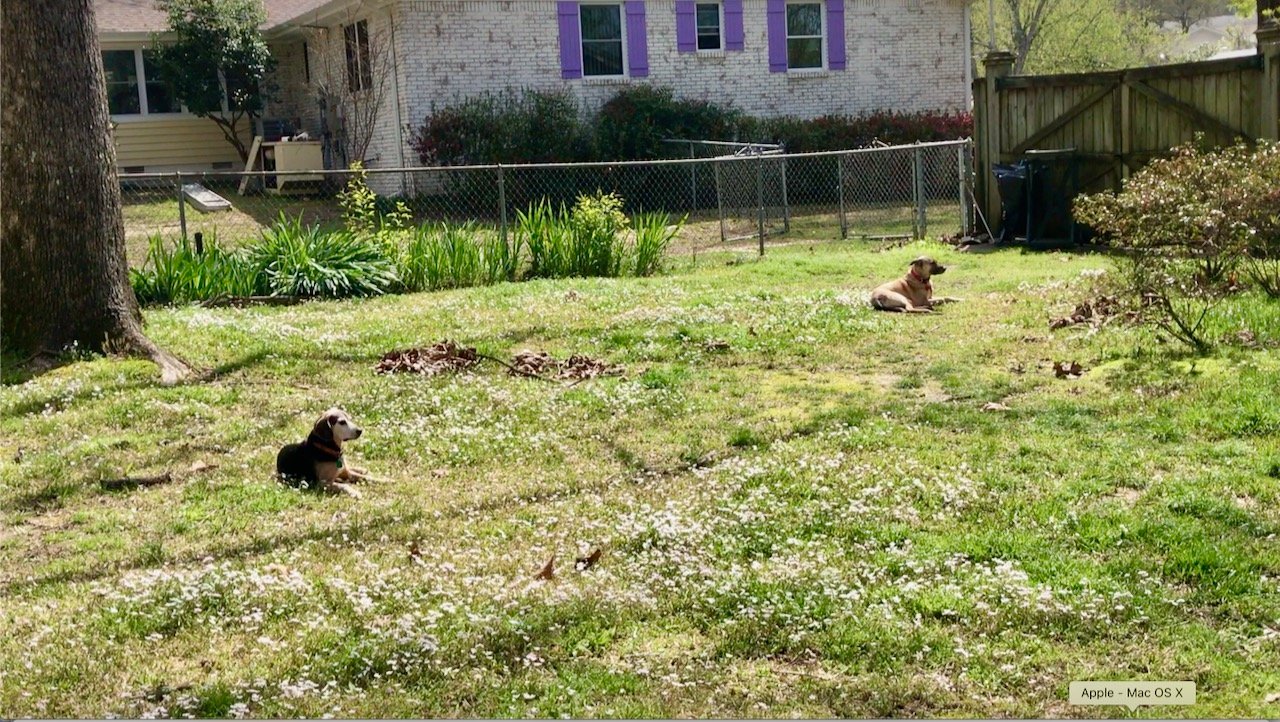
This is a revival of a post from March 2020, considerably rewritten. I wanted to play the included video in my recent webinar, but had to cut it for time. So here it is in the blog instead!
Why do dogs seem to be OK with some sounds and smells that are awful to us? This is not a clickbait question. I’m asking. I’m wondering about it because of an observation.
I’m not talking about sudden, loud sounds. That’s an easy answer. Sounds that are very loud and very sudden can trigger the mammalian acoustic startle response, a group of reflexes that fire to prepare us for danger. You all probably know what that feels like. Fear conditioning can result from such a sound.
I’m also not talking about sounds loud enough to hurt dogs’ ears. There’s at least one study that indicates that sounds over 120 decibels cause dogs to try to leave the area. Makes sense.
But what if it’s not loud enough to cause pain, but would be irritating to humans? That’s the kind of sound (or other stimulus) I’m talking about. Do they ever get annoyed, disturbed, or irritated at ongoing stimuli like we do?
I haven’t seen it in my dogs.
And before I go on—I’ve had two sound sensitive dogs and Lewis might be gaining some sound fears as well. I know the tragedy of sound phobia firsthand. I will probably never not react when I hear the certain high pitched beeps that triggered Zani. So I am not diminishing dogs’ real fear responses at all. It’s just that I notice both: what bothers dogs and what doesn’t. And what doesn’t can be pretty surprising.
This is about something that did not bother Zani.
Zani and Sound
After Zani was diagnosed with clinical sound phobia, she was vastly helped by prescription meds and later, careful application of desensitization and counterconditioning. Her default response to hearing any sort of digital beep transformed into a positive one. She turned to me or ran to me to look for a treat. Here’s a before and after video.
Caution: the video has digital beeps in it.
Once in a while, she would still melt down from hearing a sound. It might be a bird, an alarm, or even some kind of clicking. And we never tackled the low battery chirp of the smoke alarm. But even with the remaining scary things, her recovery time became minutes, rather than the hours or days it used to be.
She was not afraid of thunder or fireworks (except sometimes the whistling kind). She had an apparently normal startle response to unexpected loud noises, and didn’t stay in a fear state.
But even though she wasn’t bothered by booms and roars, what happened one day in the yard surprised me.
What a Lovely Day To Get Some Sun!

Looks pretty idyllic, right? It was a lovely spring day at the end of March 2020. And as much as I’d like to leave the punchline inside the movie, here’s a spoiler for those people with dogs who are afraid of roaring engines. There is a terrible engine noise in the video.
That noise, my friends, was the neighbor’s generator. It has a nasty, midrange, oscillating sound on top of some lower frequencies. It spins off some unlovely overtones. It was about 90 decibels where the dogs were hanging out. The full effect is extremely unpleasant—although apparently not for my dogs. Go figure.
Response To Noise: Fear Vs. Irritation
I recently gave a webinar in which I explored the qualities of noise that could be intrinsically aversive to dogs. There are a few types of noises for which there is evidence for this and some others that are likely. Two types are sounds that are loud enough to be physically damaging, and sudden sounds that evoke a startle response. I focus on my dogs whenever there’s an odd noise, to see whether they show fear, irritation, or whether they vote with their feet and get away.
But thinking back, the only time I see them leave the scene is in this situation is when they are afraid.
Have I ever seen a dog leave the scene because of a sensory irritation? An ongoing repetitive noise, blinking or super-bright light, or even an overwhelming odor? Not really. The only example I can dredge up is that I’ve seen the equivalent of an “eww” response when a dog sniffed citrus, but she just backed off a little. She didn’t leave the room. This is especially interesting given the sensitivity of dogs’ noses. Odors automatically have some duration. We are warned not to overwhelm canines with odor. But given the comparative strengths of our olfactory senses, we probably overwhelm them all the time. I’ve got my own example below.
Response to Obnoxious Odor
I don’t use many scented products. No candles, incense, room sprays, plugins, or scented laundry or body products. There’s but one exception. I make melt-and-pour soap, and I have some small amounts of high-quality essential oils. I sometimes scent the soap lightly. (Much more lightly than commercial soap.) A while back, I made some bars of soap, and I accidentally dumped way too much violet essential oil into a batch. The odor was so “loud” it gave me a headache.


I hate to waste stuff. So I tried to get the odor out of the soap. I left the completed bars of soap out in a closed room for a few days to air out. Didn’t help, and the odor in the house was still nauseating. I let them sit in the sun on the back porch for a few days. Didn’t help. Finally, I remelted them, which the soap mavens say gets rid of fragrance if you get it hot enough. We’re told that the oil will vaporize at high temperatures, so I even let the soap mixture boil for a while. This did help, but it only took the fragrance down from headache range to obnoxious. But at that point, I was able to bag them up and put them in a drawer, and that was tolerable. The house returned to normal (per my olfactory sense). I take them out one by one to use. I’m on the last one, and I’ll probably never use violet fragrance again after I use them up.
Now, what did my dogs do during this assault by odor? Nothing. They didn’t come in the kitchen saying, “What the hell?” And whenever they were in the kitchen during a burst of violet odor, they didn’t leave. They didn’t ask to go outside. As far as I could observe, they didn’t respond at all. This seemed like just another stupid human-related occurrence that was irrelevant to them.
We read so much about dogs’ amazing sense of smell. There is absolutely no doubt of it. But they also seem also to be amazingly tolerant, or habituated, or something!
What Have You Observed?


I am making no claims about dog behavior in this post. I don’t have enough information. These observations of mine “prove” nothing. But I’m curious. What have you observed? Have you ever seen a dog leave the scene in response to an ongoing (not sudden) visual, auditory, or olfactory stimulus when they weren’t afraid of it? Have you seen the equivalent of the human irritation response? The “I can’t listen to that incessant scraping/roaring/rattling noise for one more minute!” response?
How about you folks with border collies?
I do wonder if it’s a difference in cognition. A lot of the stimuli humans don’t like are repetitive, my neighbor’s generator included. Maybe we have a lower tolerance for that than dogs do?
If the noise is very loud and ongoing, our irritated response is functional. Noise that is well under the threshold for human ear damage has been shown to have negative neurological and cognitive effects on humans when there is a duration exposure (Westman & Walters, 1981).
I have used brown noise to mask scary sounds for the dogs, but it is not something I would choose to leave playing otherwise.
Habituation
We—dogs and humans—habituate. But case-by-case, it’s hard to predict whether we will habituate or sensitize to a stimulus. I don’t mind the repetitive swell of cicadas in the summer, that is, when I’m inside. For those who haven’t heard them—they can be loud. I have a harder time with things like huge waterfalls and crashing ocean waves. The masking effects of those low frequencies bother me. I don’t feel safe because I can’t hear other things in the environment. I don’t think I could ever tune them out. The neighbor’s generator has a similar effect on me, but apparently not on my dogs.


Competing Reinforcers
Some astute folks are going to point out that perhaps the dogs found being in the sun so pleasant that they were tolerating the noise. That’s possible, but it’s a big yard with lots of places they like to bask. And they appeared so relaxed! I could be wrong, but it seems to me that either they really didn’t mind, or it didn’t occur to them that they could escape at least some of the continuous noise by moving to a different sunny place in the yard that was farther away from the generator.
As a friend said recently, “Don’t you wish they could tell us?”
References
- Blackshaw, J. K., Cook, G. E., Harding, P., Day, C., Bates, W., Rose, J., & Bramham, D. (1990). Aversive responses of dogs to ultrasonic, sonic and flashing light units. Applied Animal Behaviour Science, 25(1-2), 1-8.
- Westman, J. C., & Walters, J. R. (1981). Noise and stress: a comprehensive approach. Environmental health perspectives, 41, 291-309.
Related Posts
Copyright 2020, 2023 Eileen Anderson






